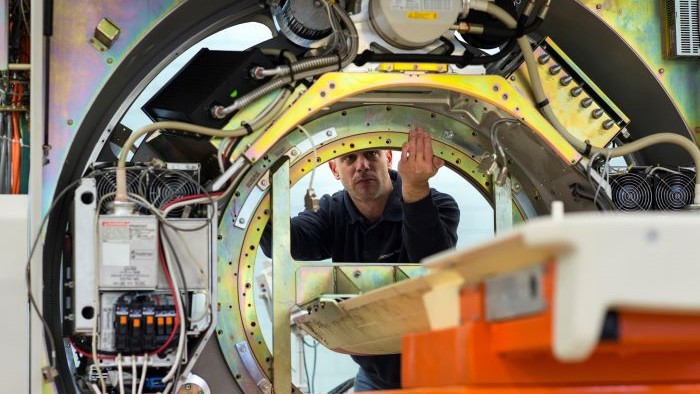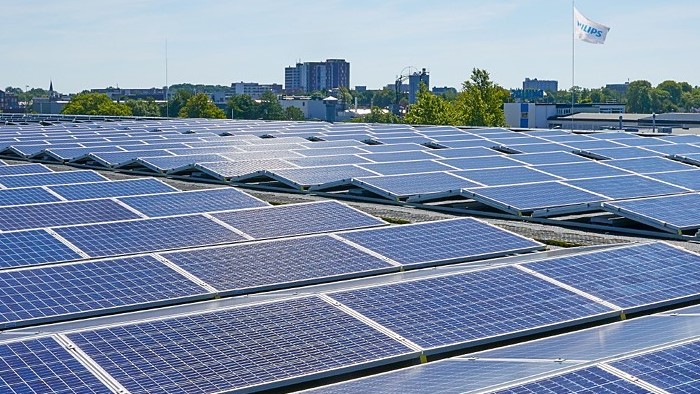Jun 05, 2023
Philips leading the change in environmental sustainability in the healthcare industry – achieves solid results in green initiatives across APAC
• Along with customers and partners across the value chain in APAC, Philips is driving positive impact through circular solutions and innovation, ensuring sustainable operations, and by driving education about going green.
Singapore – Royal Philips (NYSE: PHG, AEX: PHIA), a global leader in health technology, commemorates World Environment Day by demonstrating its commitment towards the environment and the planet with solid progress from its sustainability initiatives across APAC. The outcomes are a result of its strong focus on integrating sustainable innovation and circular business models across its products, solutions and services, day-to-day operations, and the supply chain, which contributes to climate friendly value-based care for patients and communities in APAC.
Asia Pacific, with its growing population and energy use calls for a holistic outlook towards sustainability across the value chain. At Philips, we want to leverage our position as a sustainable health technology leader to do more. From increased focus on circular products and solutions, driving sustainable innovation to our ambition in advancing towards low carbon operations and value chain, we are committed to working hand in hand with our healthcare customers and partners to create a greener and more sustainable future of healthcare in the region,”
Caroline Clarke
CEO & Executive Vice President, Philips APAC
Healthcare systems account for 4.4% of global CO₂ emissions – more than the combined contribution of aviation or shipping industry . Hospitals today produce 13 kg waste per bed per day on average, of which up to 25% is hazardous waste . Medical technologies play a vital role in improving patient care and outcomes. However, their production, usage, and disposal can generate waste, consume energy, and contribute to pollution. Philips is embedding and adopting sustainability and sustainable practices across the value chain and teaming up with healthcare providers and partners to lower the shared carbon footprint and reduce its dependency on natural resources and materials.
Driving circular solutions and innovation in APAC
The use of circular solutions is key to reducing CO₂ emissions in healthcare. In 2022, Philips increased its sales contribution from circular products and solutions in the region to 10.8%, a further increase from 9.1% in 2021. In the same year, Philips closed the loop on 47% of its medical equipment, a significant increase compared to 25.5% in 2021.
Through service, upgrades, and maintenance of the medical systems Philips supplies to hospitals, Philips has not only extended product life cycle but also reduced environmental impact. As equipment and parts can now be in use for longer or replaced through remanufacturing, refurbishment and trade-ins, Philips has significantly reduced waste and supply chain carbon footprint. In APAC, Philips continued to make progress with over 340 units of its medical systems reclaimed in 2022 alone, a significant increase from over 200 units in 2021.
Extending circular innovation to its production facilities, Philips continues to embed circular practices at all its sites in line with its zero waste to landfill ambition. Philips’ site in Batam, Indonesia, for example, applies Circular Material Management (CMM) to reduce waste sent for landfill or incineration. By 2022, the site has achieved 97.7% CMM rate, which means 2,883 tonnes (out of 3,082 tonnes) of used materials are treated with circular solutions i.e., recycled or recovered and prevented to be sent for landfill or incineration.
Creating sustainable innovation
Philips is leveraging its expertise in product innovation and EcoDesign to address energy consumption and materials use, avoid the use of hazardous substances, design for end-of-life circularity, and make product packaging easier to recycle and re-use. The company’s unique BlueSeal helium-free in operations MRI scanners, for example, massively reduce the need for helium gas produced as a byproduct of fossil fuel extraction With over 600 of such units installed globally, Philips’ technology has already saved more than 1,000,000 liters of helium, since 2018.
In addition, new product lines are now integrating sustainable practices right from the design phase. Philips’ eco-designed, new technology of sustainable products and services that reduce energy consumption have been well received in APAC – accounting for 73.7% sales for the category. Globally, Philips will design 100% of its products and services in line with Philips EcoDesign requirements by 2025, and looks to improve energy efficiency, reduce the use of resources, materials, and packaging, avoid the use of hazardous substances, and apply circular thinking – across its product life cycle.
Advancing towards low-carbon operations and value chain
Globally, in addition to remaining carbon-neutral in its operations (since 2020), Philips achieved 77% (2021: 74%) renewable energy usage, exceeding the 75% goal for 2025. It also reduced transport- and distribution-related CO₂ emissions by 22% through a stricter air-freight policy and optimized warehouse locations.
Philips is also proud that CDP, a global NGO that assesses the CO₂ emissions performance and management of reporting companies, ranked Philips on the CDP Climate Change ’A’ List for the 10th time in a row. In 2022, Philips became the first health technology company with approval from the Science Based Targets initiative (SBTi) for its entire value-chain CO₂ emissions reduction targets, including Scope 1-3. In addition, 41% of suppliers (based on spend) globally have now committed to science-based targets (2021: 28%) – Philips’ goal is 50% by 2025.
Contributing to sustainability education and partnerships
Philips Future Health Index 2023’s findings indicate that, while more than 99% of healthcare leaders globally are taking some form of initiative to address environmental sustainability, many struggle to balance it with other priorities [3]. Technical and knowledge gaps are barriers for companies to transition to newer practices. It’s important to invest in education and build technical competence and capability among employees, customers, and partners to see tangible outcomes.
“At Philips, our aim is to lead by example and resolve any barriers that prevent our industry from going green. Apart from our environmental achievements, we are driving educational programs to support healthcare providers on the shift towards a circular economy such as raising awareness on the importance of upgrading, servicing, and reclaiming of medical equipment and systems when they are no longer functioning. As a purpose-driven company, we are conscious of our responsibility towards society and of the need to embed sustainability even deeper into the way we do business – in our own operations and beyond,” said Ms. Clarke.
References: 1. Health Care Without Harm (2019). Health care’s climate footprint: How the health sector contributes to the global climate crisis and opportunities for action (p.22). https://noharm-global.org/documents/health-care-climate-footprint-report 2. Practice Green Health website. https://practicegreenhealth.org/topics/waste/waste-0 3. Future Health Index Report 2023. https://www.philips.com/c-dam/corporate/newscenter/global/future-health-index/report-pages/experience-transformation/2023/first-draft/philips-future-health-index-2023-report-taking-healthcare-everywhere-global.pdf
About Royal Philips
Royal Philips (NYSE: PHG, AEX: PHIA) is a leading health technology company focused on improving people's health and well-being through meaningful innovation. Philips’ patient- and people-centric innovation leverages advanced technology and deep clinical and consumer insights to deliver personal health solutions for consumers and professional health solutions for healthcare providers and their patients in the hospital and the home. Headquartered in the Netherlands, the company is a leader in diagnostic imaging, ultrasound, image-guided therapy, monitoring and enterprise informatics, as well as in personal health. Philips generated 2022 sales of EUR 17.8 billion and employs approximately 74,000 employees with sales and services in more than 100 countries. News about Philips can be found at www.philips.com/newscenter.












